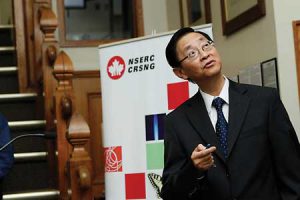
M.K. Yau developing improved techniques for short-term forecasting of precipitation
By Katherine Gombay
Why does it snow or rain much more heavily here rather than over there within the same storm system?
That’s the kind of question that Prof. M.K. (Peter) Yau of McGill’s Department of Atmospheric and Oceanic Sciences is trying to answer. He uses computational techniques that include high-resolution radar observations of weather patterns to develop highly accurate representations of cloud processes. Thanks to Yau’s research, there should be significant improvements to short-term (24- to 48-hour) precipitation forecasting techniques.
Yau, the NSERC/Hydro-Québec Industrial Research Chair in Short-term Forecasting of Precipitation was honoured at an event on Friday, May 27. It was attended by Dr. Suzanne Fortier, President of the Natural Sciences and Engineering Research Council of Canada (NSERC), M. Gaetan Lantagne, directeur scientifique de l’Institut d’Hydro-Québec, Dean Martin Grant of the Faculty of Science, and Dr. Rose Goldstein, Vice-Principal (Research and International Relations).
Accurate precipitation forecasts are crucial to being able to estimate the inflow of water into reservoirs, information that is essential to the efficient generation and distribution of hydroelectric power. New knowledge in this area will have an important effect not only on hydroelectric power generation, but will also help in predicting flooding and ensuring fresh water supplies for human consumption and agriculture.
Goldstein stressed the importance of Yau’s research, and the benefit of the collaboration between the granting agency, industry, the university and government. “The partnership between Hydro-Québec, the Natural Sciences and Engineering Research Council of Canada (NSERC), Environment Canada and researchers from McGill University, creates unique opportunities for collaborative work that promises to serve local, national and global needs for better precipitation forecasts,” Goldstein said. “McGill University will enhance its already significant international leadership in precipitation research and is pleased to have this opportunity to contribute as an international centre of knowledge in this area.” Goldstein went on to thank Hydro-Québec, NSERC and Environment Canada for their support of this initiative designed to ensure a more secure and stable energy source in the future.
